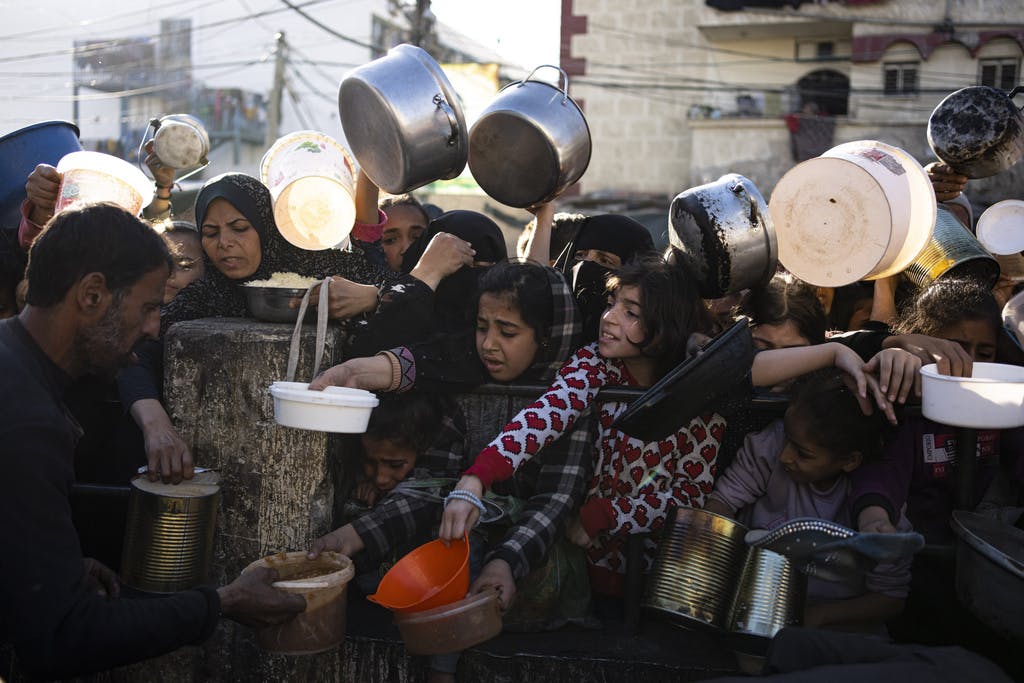Concerns Grow, in Congress and the United Nations, That Biden’s Gaza Relief Plan Is a Pier to Nowhere
Biden’s announcement of the plan in his State of the Union Address earlier this month was the easy part.

American vessels are sailing for Gaza with components of President Biden’s floating pier, which he aims to complete by May 1. Back on land, criticism of the project to aid the beleaguered enclave are growing, casting doubt about whether it puts American service members at risk for a pointless mission.
Mr. Biden announced the plan in his State of the Union Address earlier this month. “I’m directing the U.S. military,” he said, “to lead an emergency mission to establish a temporary pier in the Mediterranean on the coast of Gaza that can receive large shipments carrying food, water, medicine, and temporary shelters.”
Up to 1,000 American troops will snap together the floating structure three-to-five miles offshore in the western Mediterranean Sea. It will then be moved into position and connected to Gaza by a causeway a third-of-a-mile long. Even so, Mr. Biden said, “No U.S. boots will be on the ground.”
The pledge sounded untenable from the start.
Someone will have to tether the causeway to land and provide security throughout construction and operation, but the Biden Administration can’t say who. The Chief of Staff of the National Security Council, Curtis Ried, told journalists at Cyprus that Israel would secure the area and that they’re talking to “a number of countries” about safeguarding Americans.
The Democrat of Connecticut, Senator Blumenthal, told Politico he has “very serious questions about how the construction will be done with the assurance of safety to our troops.” The Democrat from Mr. Biden’s home state of Delaware, Senator Coons, told the publication that he also worries about sending troops into harm’s way.
Mr. Coons joined bipartisan calls for hearings on the pier. “In particular,” he said, “one of my concerns is security for this operation. Because if the U.S. military is seen to be building and operating it, I think it puts it at greater risk.”
The project could distribute up to two million meals a day, but just who would serve them on such a massive scale is also yet to be determined. NBC News reported earlier this month that Biden Administration officials “do not expect Hamas would be directly involved in distribution.”
On Face the Nation, Senator Rubio, Republican of Florida, expressed “real concern” about the pier’s chances for success. He said there’s “reason to believe that any aid that goes in there will be grabbed by Hamas and used for their purposes at the expense of the civilian population.”
Mr. Biden will have to convince Hamas to refrain from attacks and to let the pier operate. That’s unlikely since “Palestinians fear,” the Cradle reported last week, “the port will be used to forcibly expel Gaza’s 2.3 million residents by sea, rather than to deliver aid.”
Hamas fanned concerns about ethnic cleansing after a report by an Israeli think tank. Two weeks after the October 7 attacks, the Misgav Institute for National Security & Zionist Strategy said it presented a “unique and rare opportunity” for the “relocation and final settlement of the entire Gaza population.”
United Nations officials and non-governmental organizations are also dubious. “When I read about the pier,” CARE International’s Vice President of Humanitarian Affairs, Deepmala Mahla, told Devex, “my reaction was, ‘Really?’”
Ms. Mahla said the pier, like air drops, are unnecessary “when we have hundreds and thousands” of vehicles loaded with “food and other required material just miles away from the border, all ready to get in” from Egypt, which has sealed its border with Gaza.
“The only efficient and effective way to move heavy goods is by road,” the U.N. secretary-general, Antonio Guterres, told the press in a statement on Sunday at Cairo. “Seven out of every ten people” in Gaza, he said, “are already on the brink of famine,” and they’d have to wait over a month for Mr. Biden’s pier to be operational.
Proposing the relief effort in the State of the Union was an easy political win for Mr. Biden. The practical execution is proving more difficult. Expect Congress to ask more questions as the pier’s sections approach the Mediterranean, and American troops sail into the unknown.

